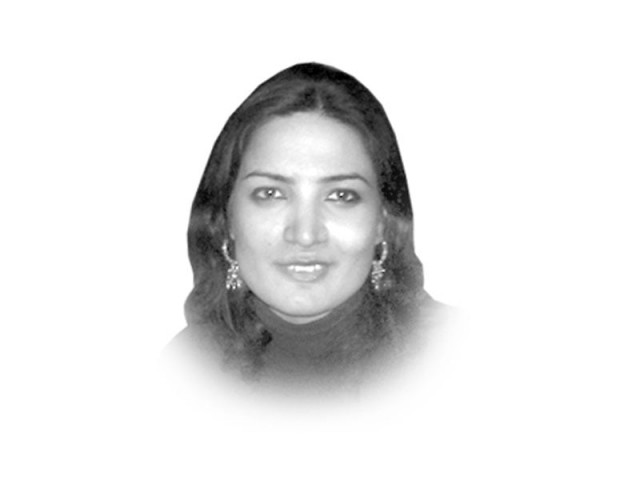Gender and television
It is about time we challenge TV narrative that focuses on taming female sexuality and glorifies sacrificial women.

The writer is an Islamabad-based freelance communications consultant. She tweets @tazeen and blogs at http://tazeen-tazeen.blogspot.com
Take the case in point of a television serial ‘Zindagi Gulzar Hai’ airing on Hum TV these days. Only last week, the male protagonist of the story picked a fight with his girlfriend about her clothing and a direct quote from the play said, “if you had seen her clothes, you would have known that she was a walking invitation for harassment”. In times like these, where there is global protest about women’s clothing and how it has no relevance to the sexual violence they face, here is a drama where a protagonist — who is extremely popular among women — is telling women that yes, their clothing invites men to harass them. In case anyone is wondering, the woman was wearing a sleeveless top with a shawl draped around her shoulders.
This was not the lone case of misogyny in that particular play. The protagonist also had issues with the mobility of his female family members. He wanted to impose a curfew for his sister and wanted his mother to seek the permission and approval of his father before she could leave the city on a work assignment. He said repeatedly that “he is a man and can go wherever he wants and whenever he wants and women cannot do the same”. While it may be a reality in our society, reinforcing such ideas in the guise of propriety and religiosity is shoddy and has consequences for the audience. What disappointed this scribe even more is the fact that both the writer and the producer were women and that the producer has a personal history of struggling for her rights.
Our television plays seem to glorify the role of women who are situated within the four walls of their homes, sacrifice their happiness for their families and do not complain if their husbands beat them or take second wives or are just really horrible to them. Those who are financially independent, situated outside their homes and interact with men who they are not related to are the bad ones. This does not only judge all women who choose to interact with others in the public sphere, but also presents a distorted version of reality to women who stay at home, that all those who do step out in the public sphere do so after compromising their morality.
Ours is a society that is used to either lecture or indoctrination. It is a society where powerful forces indulge in monologues and there is hardly any room for dialogue. We do not open up conversation on gender; we tell people what is appropriate through Islamic programmes, television dramas and literature and expect them to follow what is told.
It is about time we challenge the television narrative that focuses on taming female sexuality and identity, and glorifies the sacrificial women whose ideal sphere of activity is the private space and is critical of those who venture out in the public space and implies that they do it at the cost of compromising their morality and roles assigned by religion. In any case, the concept of a stay-at-home woman is a very urban middle class one and if half the population had stayed at home, the economy would have collapsed a long time back.
Published in The Express Tribune, January 8th, 2013.
















COMMENTS
Comments are moderated and generally will be posted if they are on-topic and not abusive.
For more information, please see our Comments FAQ